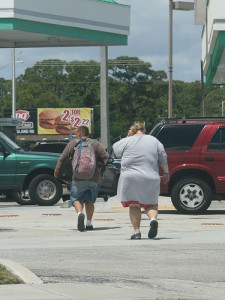Why are we getting so fat? Elizabeth Kolbert answers that question in many ways in her article, "XXXL" in the New Yorker. Her answers come from the several new books on obesity that she reviews in her article. Here are some of her observations:
- We have evolved a "taste for foods that are high in calories and easy to digest; just as it is natural for gorillas to love leaves, it is natural for people to love funnel cakes."
 -The only place pre-modern humans had to store energy "was on themselves. Body fat is energy-rich and at the same time lightweight" and "a person with a genetic knack for storing fat would have had a competitive advantage."
It is too easy to eat high calorie food in the modern U.S. “We evolved on the savannahs of Africa,” Power and Schulkin write. “We now live in Candyland.”
Or, consider David Kessler's approach, that are the victims of "eatertainment":
-The only place pre-modern humans had to store energy "was on themselves. Body fat is energy-rich and at the same time lightweight" and "a person with a genetic knack for storing fat would have had a competitive advantage."
It is too easy to eat high calorie food in the modern U.S. “We evolved on the savannahs of Africa,” Power and Schulkin write. “We now live in Candyland.”
Or, consider David Kessler's approach, that are the victims of "eatertainment":
In “The End of Overeating” (Rodale; $25.95), David A. Kessler, a former commissioner of the Food and Drug Administration, takes a somewhat darker view of the situation. It’s not that sweet and oily foods have become less expensive; it’s that they’ve been reëngineered.
-There's bigger problems. We eat too much because we are oblivious to how much we are eating:
Brian Wansink’s “Mindless Eating” (2006). They have no idea how much they want to eat or, once they have eaten, how much they’ve consumed. Instead, they rely on external cues, like portion size, to tell them when to stop. The result is that as French-fry bags get bigger, so, too, do French-fry eaters.
-Kolbert points out that bagels have grown by 210 calories over the past couple of decades:
For someone who is in the habit of eating a bagel a day, these extra calories translate into a weight gain of more than a pound a month.
Who is gaining the most weight? "Those living just above the poverty level."
What are the documented medical risks for being obese?
Type 2 diabetes, coronary disease, hypertension, various kinds of cancers—including colorectal and endometrial—gallstones, and osteoarthritis are just some of the conditions that have been linked to excess weight.
Kolbert's article is an excellent review of much recent research focusing on the causes of obesity and potential solutions.





